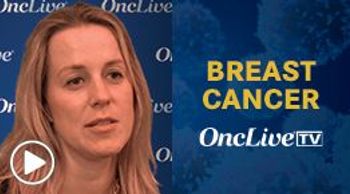
Erika P. Hamilton, MD, discusses the investigation of patritumab deruxtecan in heavily pretreated patients with metastatic estrogen receptor-positive or triple-negative breast cancer with varying levels of HER3 expression in a phase 2 trial.

Your AI-Trained Oncology Knowledge Connection!


Erika P. Hamilton, MD, discusses the investigation of patritumab deruxtecan in heavily pretreated patients with metastatic estrogen receptor-positive or triple-negative breast cancer with varying levels of HER3 expression in a phase 2 trial.

Kidney and renal pelvis cancers are one of the 10 most common new malignant diagnoses in both men and women in the United States, with an estimated 52,360 new cases in men and 29,440 new cases in women per year.

Key opinion leaders share a broad perspective on relapsed/refractory diffuse large B-cell lymphoma and the current treatment landscape.

Expert panelists open their discussion on diffuse large B-cell lymphoma by reflecting on diagnostic strategies and the frontline treatment armamentarium.

Melissa L. Johnson, MD, discusses findings from the phase 2 ARC-7 trial in patients with previously untreated metastatic, PD-L1–high non–small cell lung cancer.

Melissa L. Johnson, MD, discusses findings from the phase 1 BL-B01D1-101 trial investigating the efficacy and safety of the EGFR- and HER3-directed antibody-drug conjugate BL-B01D1 in patients with locally advanced or metastatic solid tumors, including non–small cell lung cancer.
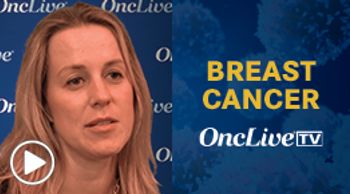
Erika P. Hamilton, MD, discusses the efficacy and safety of adjuvant abemaciclib plus endocrine therapy in patients with hormone receptor–positive, HER2-negative, high-risk early breast cancer according to age.

Patritumab deruxtecan displayed manageable safety and produced responses in heavily pretreated patients with estrogen receptor–positive or triple-negative metastatic breast cancer with varying levels of HER3 expression, according to data from a phase 2 study presented at the 2023 ASCO Annual Meeting.

A clinically meaningful absolute risk reduction in invasive disease-free survival and distant relapse-free survival with abemaciclib plus endocrine therapy was maintained in patients with hormone receptor–positive, HER2-negative, high-risk early breast cancer regardless of age.

The combination of darovasertib and crizotinib demonstrated clinical activity and an acceptable safety profile when utilized in first- and any-line patients with metastatic uveal melanoma.

Erika P. Hamilton, MD, director, Breast and Gynecologic Cancer Research, Sarah Cannon Research Institute, discusses the potential of the PI3K inhibitor RLY-2608 in PI3K-mutated breast cancer.
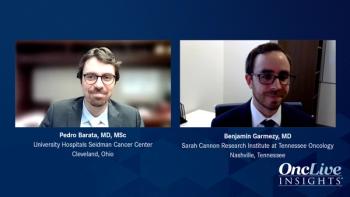
Pedro Barata, MD, MSc, and Benjamin Garmezy, MD, close their discussion with clinical pearls for community oncologists treating patients with advanced RCC.

Despite a high-profile clinical disappointment, the TIGIT immune checkpoint remains an important target for anticancer therapy, with research programs testing novel agents moving forward in non–small cell lung cancer and a range of other tumor types.
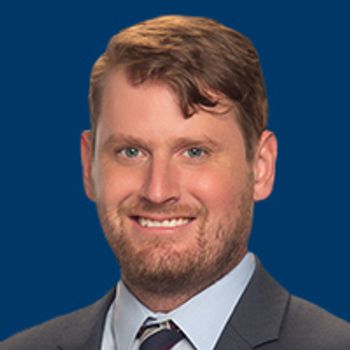
In an era of genomics, proteomics, and immunology a biomarker as simple as anatomy may be useful in terms of predicting responses in patients with colorectal cancer.

Drs Barata and Garmezy give detailed thoughts on treating patients with advanced RCC who have received prior immune checkpoint inhibitors.

A comprehensive overview of the TIVO-3 trial, which compared tivozanib with sorafenib in patients with advanced renal cell carcinoma.
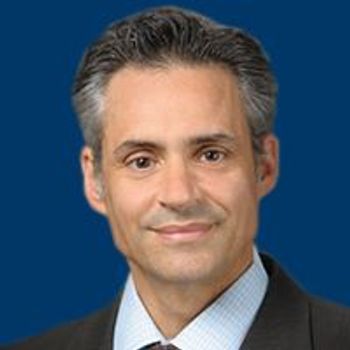
Robert L. Coleman, MD, FACOG, FACS, discusses a subgroup analysis of the SORAYA trial, which was presented during the 2023 Society of Gynecologic Oncology Annual Meeting on Women’s Cancer, and where the field is headed in attempt to address unmet needs for this patient population.

Experts on renal cell carcinoma discuss post-progression treatment options for RCC.

Pedro Barata, MD, MSc, and Benjamin Garmezy, MD, outline factors taken into consideration when selecting advanced RCC treatments.

Renal cell carcinoma experts discuss clinical trials, evaluating immunotherapies and tyrosine kinase inhibitors in the front line setting of advanced RCC.

Benjamin Garmezy, MD, presents the case of a 67-year-old man diagnosed with advanced renal cell carcinoma.

Experts on renal cell carcinoma describe the RCC histologies and tools used for risk stratification.

Pedro Barata, MD, MSc, and Benjamin Garmezy, MD, open the discussion with an overview of renal cell carcinoma.

Precision medicine and personalized medicine are 2 concepts that have pushed their way to the forefront of oncology practice.
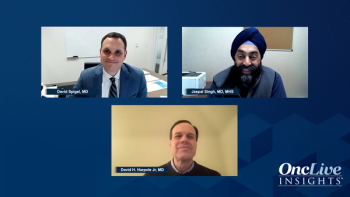
Looking to the future, a panel of experts offer closing remarks on promising developments and unmet needs in the treatment of NSCLC.
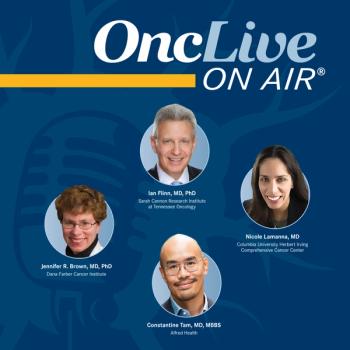
Drs Flinn, Lamanna, Brown, and Tam discuss the FDA approval of zanubrutinib in chronic lymphocytic leukemia and small lymphocytic lymphoma.

Experts discuss the role of neoadjuvant therapy and other emerging therapies in the treatment of early-stage NSCLC.

Jaspal Singh, MD, MHS, shares insights on treatment strategies for patients with stage II-IIIA NSCLC.

With 2 KRAS G12C inhibitors showing encouraging results in combination with anti-EGFR agents, there is a ray of hope for patients with recurrent colon cancer–a treatment that may offer patients the chance to make it to important milestones.

David H. Harpole Jr, MD, presents a case of a former smoker diagnosed with NSCLC, and David Spigel, MD, offers his initial impressions.